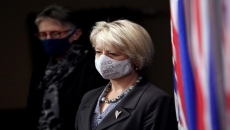OTTAWA - A spike in health-care spending during the COVID-19 pandemic could lead to some serious financial challenges for provinces as they work to rebuild their health systems in the aftermath, according to the Canadian Institute for Health Information.
The spending surge is expected to reach a record $308 billion in 2021, say newly released projections from CIHI.
That is roughly $8,019 per Canadian.
"COVID-19 resulted in the single biggest increase in health spending we have ever seen in this country," said CIHI president David O’Toole in a news release.
Health spending is projected to have increased 12.8 per cent between 2019 and 2020. That's more than triple the average annual growth rate seen from 2015 to 2019, which was approximately four per cent per year.
Spending is estimated to have increased another 2.2 per cent between 2020 and 2021.
The agency said its estimates will be updated as final spending amounts are tabulated, and may be less accurate than normal given the nature of emergency funds spent during the pandemic.
Still, the numbers add up to a troubling future as Canada works to recover from the pandemic and get health systems back on their feet.
"We know that in times of fiscal restraint we have less to spend on health care, so there'll be some decisions in the future. It's obviously a finite pot of money," said Brent Diverty, vice-president of data strategies and statistics for CIHI.
Historically, increases in health spending have been in step, or slightly greater, than increases in economic growth. When provinces hit hard times, they usually spend less on health care.
But in 2020, the spike in health spending to scale up system capacity, testing and other pandemic responses was paired with a serious contraction in the economic health of the country. The GDP dropped 4.6 per cent that year, according to the latest federal budget.
Now, as the fourth wave of the pandemic ebbs and health systems turn to the surgical and primary-care backlogs left in its wake, they'll have to figure out how to handle the extra load while carrying mounting health-spending deficits.
There may be other pandemic developments, however, like the rise in virtual care, that could offset some of the costs moving forward.
Some innovations are "in fact making the system more sustainable or affordable," Diverty said.
Even before the pandemic, health spending had been rising steadily for decades.
The Liberal government committed an additional $6 billion to help pay for health-system backlogs exacerbated by the pandemic in the last federal election, though the specific requirements for that funding must still be negotiated with provinces and territories.
The party promised another $3.2 billion to hire family doctors, nurses and nurse practitioners.
Provinces and territories have asked to meet with the prime minister before the speech from the throne expected later this month.
The premiers have asked the federal government to take on a larger share of health spending moving forward.






